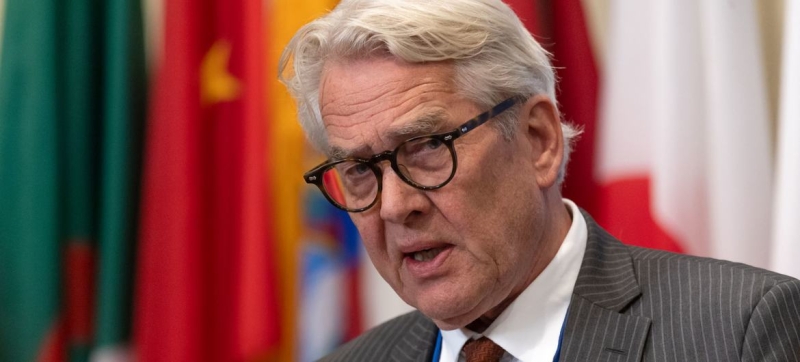
UN Special Envoy for the Middle East Peace Process Thor Wennesland. INTERVIEW | Middle East Special Envoy Ends Mission: ‘Diplomacy Has So Far Failed’ Peace & Security
The Gaza war has become the “biggest test of endurance” the UN has ever faced in its efforts to achieve peace and a two-state solution for Israelis and Palestinians, UN Special Envoy for the Middle East Peace Process Thor Wennesland, who has been in office since 2021, told UN News Service in an exclusive interview.
“After more than a year of conflict, we have reached a point where diplomacy has failed in an extremely difficult geopolitical situation,” Wennesland said.
Stepping Down
A Norwegian diplomat is stepping down as the UN’s Special Coordinator for the Middle East Peace Process after decades of efforts to improve relations in the region. Wennesland was an adviser to Norway’s Foreign Ministry during the process that led to the Oslo II Accords in 1995 over the West Bank and Gaza Strip. He also represented Norway in the Palestinian Authority and served as ambassador to Egypt and Libya.
“I have abused my family’s patience for over 15-20 years with this issue, and at some point you have to decide how much longer you are willing to continue,” he said.
Hope Remains
Wennesland continues to call for a ceasefire in Gaza, the release of all hostages and humanitarian access. He still believes that peace between Israelis and Palestinians is possible, and that the two-state solution in line with UN resolutions remains viable despite efforts to undermine it.
He also expressed hope for progress in efforts to end the war, saying: “We need to get to a point where we can sit down and calmly think about ways out. We are getting there.”
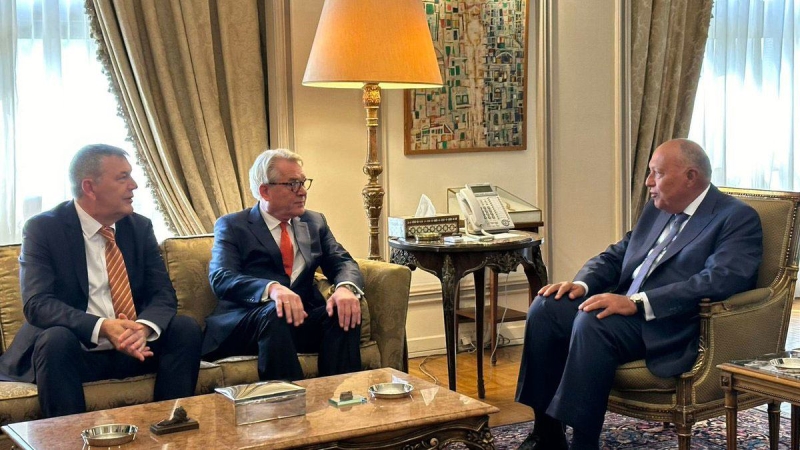
UN Special Coordinator for the Middle East Thor Wennesland (center) and head of the UN Relief and Works Agency for Palestine Refugees (UNRWA) Philippe Lazzarini during a meeting with Egyptian Foreign Minister Sameh Hassan Shoukry Selim.
The text of the interview has been edited for brevity and clarity.
Thor Wennesland: In the past, in other circumstances – and I have been working on this issue since the signing of the Oslo II Accords – there have always been difficulties, difficult periods, but this time it was like an avalanche that caught everyone by surprise.
And this happened at a time when there was no clear political dynamics on the issue at all. We very quickly found ourselves in a situation where events immediately led to escalation, including in the West Bank, where tensions also remained.
Frankly, everyone involved was rushing around looking for a solution. No one had a clear plan on how to deal with this – neither the parties themselves, nor the regional players, nor the UN. For the UN, this was the most serious test of strength on this issue, and we had to urgently expand our resources and look for solutions.
However, given that so many unsuccessful efforts have been made to end this war over the past 14 months, and the conflict is still ongoing, we are at a point where diplomacy has proven powerless in the face of an extremely complex geopolitical situation.
UN News Service: After everything that has happened, do you think that the peace process, including the two-state solution, can still be revived? And is that still the basis for negotiations?
Tor Wennesland: Absolutely. I’ve talked to a lot of different people in my work, and no one defines the peace process any other way except those who are trying to destroy the idea, and that’s happening right now.
My greatest concern is that we are losing the parameters that we have been working within since 1967 and 1973, which were established by Security Council resolutions. What we are seeing is an obvious campaign to destroy the institutional structures that were supposed to form the basis of a Palestinian state. And it is happening with a speed and intensity that I have never seen before.
The problem is that if the forces seeking to undermine the two-state solution are successful, the consequences will be serious and obvious. Within the UN system, this is already causing systemic difficulties for both the agencies and the UN as a whole; the situation is extremely difficult.
But we must not forget that the ability of the Palestinians, with the support of the international community, to strengthen their own capacity to govern Palestine is being destroyed. It is really under extreme pressure, even more than the UN system, and it is the Palestinian population that suffers most from this.
I can assure you that the situation in Gaza is absolutely terrible; to see the conditions in which the population lives is horrific. But there is also a fear factor in the West Bank as people see the existing structures being destroyed.
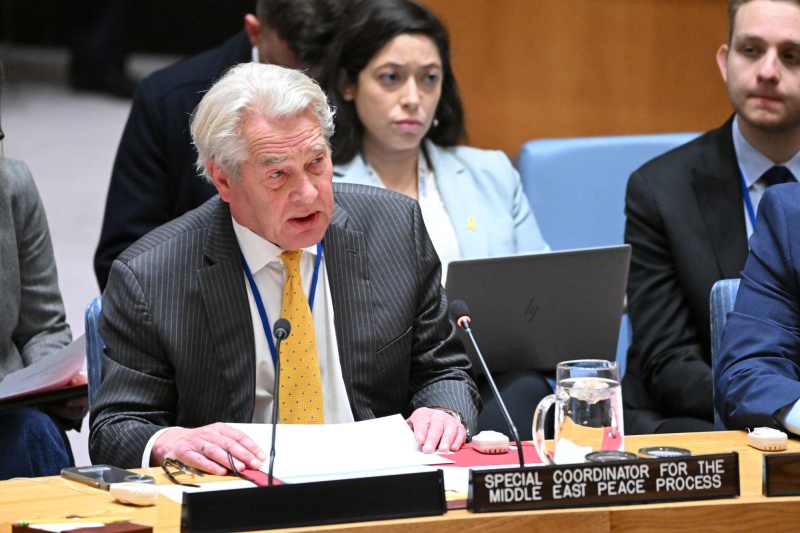
Thor Wennesland briefs the Security Council.
UN News Service: You mentioned forces that seem to be deliberately undermining a Palestinian state and a two-state solution. But what can the UN and the international community do now to remedy this situation??
Tor Wennesland: There is no quick fix, but there must be determination and a will to act. I am in very close dialogue with the countries of the region. These are the ones who have the greatest stake in stability in the region, in addition to the Israelis and the Palestinians themselves.
Let’s not forget that the crisis is also destroying Israel. Israel’s economy is declining and there is tension in the country that I have not seen in all my time here. The balance in both Palestine and Israel has been disrupted and it will take a lot of effort to restore it.
We need to stick to two things. First, international principles and international law, and not abandon them for a second, otherwise we will set a dangerous precedent that can be used elsewhere.
Second, the UN must do everything possible to provide humanitarian support to ordinary people on the ground, and we are doing this in extremely difficult circumstances, where UN staff are exposed to enormous risks and we have significant casualties among our personnel. And at the same time, we must mobilize all resources to find a political solution.
UN News Service: You told the Security Council that current events will have consequences for generations and will change the region in ways we do not yet fully understand. What consequences are you most worried about?
Thor Wennesland:The Palestinian population is very young. If we do not offer them a way out, they will be recruited. And we must remember that the crisis will have a negative impact on the entire region, and certainly on neighboring countries, but also elsewhere. The Israeli-Palestinian conflict is having an impact all over the world – on the streets of European capitals, in the United States, Australia, and of course in the region itself.
We are playing a risky game with a young generation that, without prospects, may find other ways to express its discontent. This is very dangerous for everyone.
UN News Service: You mentioned in the Security Council that if the parties do not find a way out, the international community will have to find a way forward. As you see it now, given the new events in the world, the change of governments, new administrations?
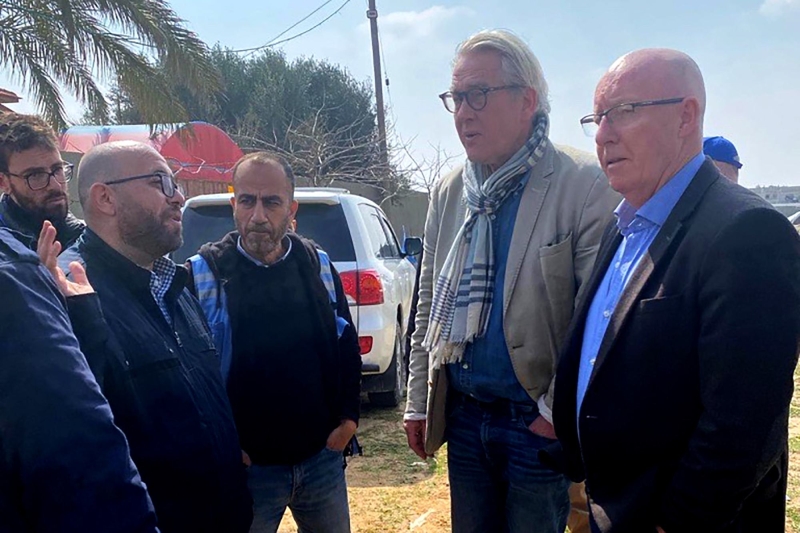
Wennesland during a visit to Gaza.
Tor Wennesland: The world as it is. We must accept reality, because only then can we engage in real realpolitik.
But, as I said, some of the key principles on which the work on the Israeli-Palestinian conflict and the Israeli-Arab conflict was based are now under threat. The only way the international community can set the course again is through decisions of the Security Council.
Of course, you can have seminars and conferences, but you have to base it on decisions of the Council. And we have no time to waste.
UN News Service: But what can motivate influential countries to make any effort when we know that the Security Council has been divided on this issue for over a year?
Tor Wennesland: In fact, the Security Council is not divided on the two-state solution. In all the more than 50-60 meetings in the Council during my tenure here, this principle has remained unchanged.
There is a broad international consensus on these principles, but it is being undermined, and we need to face the facts. The last political decision of the Council, eight years ago, on Resolution 2334, dealt with a completely different situation in Gaza.
The changing situation in Gaza has never been addressed by the Security Council as an issue requiring decisions on the territorial question, the borders and the occupation – the Council has never taken a position on this. And in fact, it is not difficult to apply the same principles that were affirmed in UN Security Council resolutions or in the agreements negotiated after the Oslo Accords.
These principles need to be re-applied, and at the center of this must be a Palestinian governance structure if we are to achieve the creation of a Palestinian state. There is an international consensus on this too, so we need to build on what we already have. But until this is clearly formulated, we will not have the necessary basis for resolving the conflict.
UN News: Those who support either side, either the Israelis or the Palestinians, sometimes claim that the UN is not doing enough, especially in the political sphere. What would you like to tell them about the work of the UN and your role?
Tor Wennesland: As I said, this is a conflict of a scale not seen since the establishment of the state of Israel. There has never been a conflict that lasted 14 months, with such intensity, with such casualties and destruction as we are seeing now.
Of course, we have made efforts to prevent the escalation that we are seeing now in Lebanon and elsewhere in the region. We’ve never seen anything like this in this region.
In the first week of the conflict, that was my focus. Then it became a question of finding a way out of it and moving forward at the same time, in the midst of intense fighting.
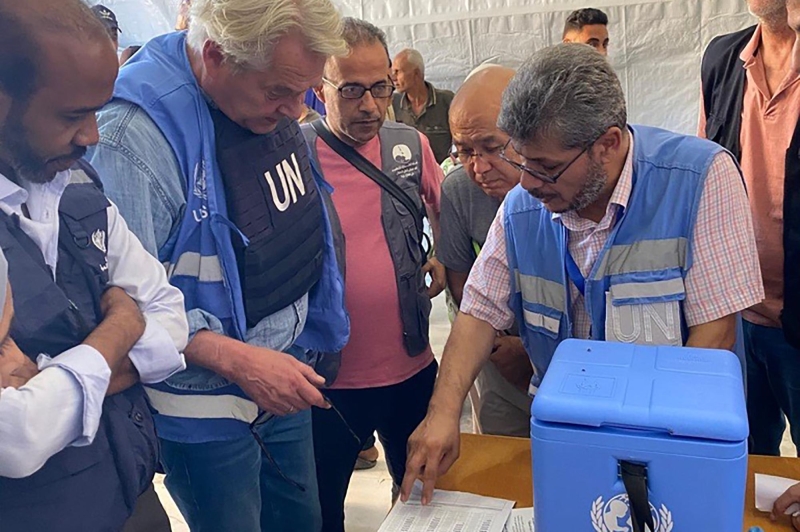
Tor Wennesland (2nd from left), Special Coordinator for the Middle East Peace Process, visits an UNRWA polio vaccination centre in Deir Balakh, Gaza, September 2, 2024.
We have to get to a point where we can sit down and figure out how to get out of this. And we are getting to that point. We couldn’t get there in November, when we were getting ready to take part in the evacuation of hostages. We couldn’t do it while the war was going on, when people in Gaza were being cornered. But we are getting there now. We always need to find a way out of conflict through diplomacy and making decisions that will allow us to move forward.
Of course, we need a ceasefire, the release of hostages, a long-term truce and security – for both Palestinians and Israelis.
I was in Gaza when we had a temporary respite for the UN-organized vaccination campaign, and it gave short-term relief to people who had gone through enormous trauma. We don’t have a ceasefire now, and we need to get the support of the international community and regional partners to strengthen this process and these efforts.
UN News Service: Am I correct in understanding that you are hinting at some progress in resolving the situation??
Tor Wennesland: I won’t go into the details of what is happening. I would welcome the opportunity to discuss the key principles and ways out of the situation. But when you work as a diplomat on these issues, you have to be patient and wait for the right moment. We are approaching that moment now, but we have to use it wisely and quickly, otherwise it will slip away.
UN News Service: Before you leave your post, what would you like to say to the Israelis and the Palestinians?
Tor Wennesland: All the people here are deeply traumatized, and it will take many years to recover from what they have been through. So I think the international community has to take a leadership role. We have not been subjected to these traumas. We need to look from the outside to understand what is happening and try to work out a solution that both sides can at least partially accept. And, as always, the compromises will be ambiguous.
